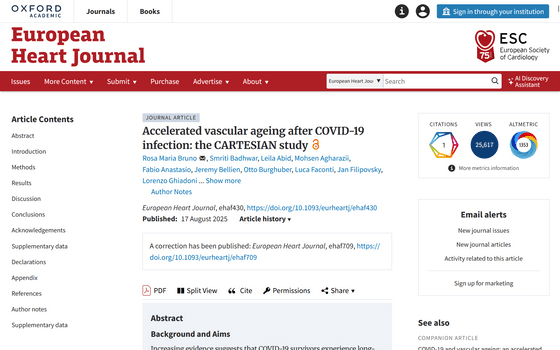COVID-19 ages blood vessels, especially in women

A new study suggests that COVID-19 may accelerate the aging of blood vessels by approximately five years, particularly in women. Blood vessels gradually stiffen with age, but COVID-19 may accelerate this process.
Accelerated vascular aging after COVID-19 infection: the CARTESIAN study | European Heart Journal | Oxford Academic

COVID infection ages blood vessels, especially in women, research reveals
Professor Rosa Maria Bruno and her colleagues at the University of the City of Paris in France investigated the relationship between a history of COVID-19 infection and cardiovascular health in 2,390 subjects from 16 countries who were recruited between September 2020 and February 2022.
The participants were classified into those who had never been infected with COVID-19, those who had recently been infected but not hospitalized, those who had a history of hospitalization in a general ward due to COVID-19, and those who had a history of hospitalization in an intensive care unit due to COVID-19.

The researchers then measured each subject's vascular age using a device that measures the speed of blood pressure waves traveling between the carotid artery (neck) and the femoral artery (leg). This measurement is called carotid-femoral pulse wave velocity (PWV). A higher value indicates stiffer arteries and a higher vascular age.
The researchers also recorded demographic information, such as the patients' gender, age, and other factors that may affect cardiovascular health, to examine possible associations.
After taking these factors into account, they found that all infected groups, including those with mild COVID-19, had increased arterial stiffness compared to uninfected patients. This effect was greater in women than in men, and more pronounced in people who experienced 'long COVID' symptoms after infection, such as shortness of breath and fatigue.

The mean increase in PWV in mildly affected female patients was 0.55 m/s, 0.60 m/s in hospitalized women, and 1.09 m/s in intensive care women. The researchers explain that an increase of approximately 0.5 m/s is equivalent to an increase in age of approximately five years, and that for a 60-year-old woman, this increases the risk of cardiovascular disease by 3%.
Vaccinated individuals generally had lower arterial stiffness than unvaccinated individuals, and over the long term, the vascular aging associated with infection tended to stabilize or even slightly improve.
'There are several possible explanations for COVID-19's effects on blood vessels. COVID-19 acts on a specific receptor, angiotensin-converting enzyme 2, present in the endothelium of blood vessels, and uses this receptor to enter cells and cause infection, which may lead to vascular dysfunction and accelerated vascular aging. In addition, the body's inflammatory and immune responses, which help defend against infection, may also be involved,' said Professor Bruno.
One reason for the gender gap may be due to differences in the immune system: Women mount a faster and stronger immune response than men to protect themselves from infection, but this response can also increase damage to blood vessels after an initial infection.
Professor Bruno and his colleagues plan to follow up on the subjects for several years to determine whether the accelerated vascular aging they observed in this study translates into an increased risk of heart attack and stroke in the future.
'COVID-19 appears to cause what we call 'premature vascular ageing', where blood vessels age faster than the person's actual age, making them more susceptible to heart disease,' said Professor Bruno. 'Vascular ageing is easy to measure and can be addressed with widely available treatments, such as lifestyle changes and antihypertensive and cholesterol-lowering medications. For people with accelerated vascular ageing, it is important to reduce their risk of heart attack and stroke as much as possible.'
in Science, Posted by log1p_kr